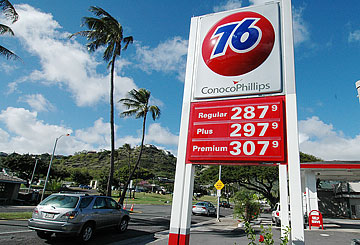
ASSOCIATED PRESS
Motorists in Hawaii continue to pay the highest prices for gas in the nation. Above, a gas station sign showed the cost of fuel per gallon on Saturday. CLICK FOR LARGE
|
|
Legislators frustrated about high gas prices
But the state PUC has not yet formally asked oil refiners in Hawaii to disclose details of their pricing practices*
By Mark Niesse
Associated Press
Frustrated with the failure of the nation's only gas price controls, Hawaii lawmakers are trying to force the oil companies to reveal why gas prices are so high in a captive island market.
But eight months after the gas cap experiment was repealed, state government has not yet enforced a compromise law that requires local oil refineries to reveal their pricing practices to the Public Utilities Commission.
Democrats accuse the state's Republican governor of protecting oil interests. The governor's administration has blamed lawmakers for not funding the project. Regulators say they need more time.
The two refiners, Chevron and Tesoro, both say they don't want to reveal sensitive information that could hurt the industry.
Meanwhile, motorists continue to pay the highest pump prices in the nation -- an average $2.92 for a gallon of regular this weekend.
"The commission hasn't placed a high priority on holding the oil companies accountable for the excessive profits they've been earning," said state Sen. Ron Menor, D-Mililani, unsuccessful U.S. congressional candidate who has led the fight for fuel regulation. "The consumers of Hawaii would like to see some relief from gas prices."
Under the law passed in the waning hours of the 2006 legislative session, Hawaii's two oil refiners were required to periodically disclose the number of gallons sold and imported, the wholesale fuel prices they charge, their operating expenses and their profit margins.
The idea was that lawmakers could come back this year and use that information to make more effective regulations to bring down pump prices for consumers. Previous efforts, such as the state-mandated gas price controls, failed in part because no one could determine a fair price without the data.

ASSOCIATED PRESS
State lawmakers are trying to find out why motorists continue to pay the highest pump prices in the nation. Above, Catherine Carreon on Saturday filled up her car with gasoline in Honolulu. CLICK FOR LARGE
|
|
As lawmakers prepare to open the 2007 session tomorrow, there's no indication whether this year will bring much relief from the state Capitol other than a possible reinstatement of an 11-cents-per-gallon tax break for ethanol-blended gasoline that lapsed Jan. 1.
The Public Utilities Commission has been negotiating with a company that would create a database to analyze gas pricing information, and it has hired an economist, said chief researcher Lisa Kikuta.
"We are mindful of the desires of the lawmakers and consumers who would like to see this information and some analysis done sooner," Kikuta said. "It hasn't come together as quickly as some people would like."
There are many reasons for the delay.
The Legislature gave the commission only $1 to collect and analyze the oil companies' pricing information, and the only other funds available for that project came from a $316,000 interagency transfer.
The commission hasn't specified exactly how much money it needs for the analysis, Kikuta said.
Another problem is that much of this gas information is both confidential and complex, which means the government must find a way to publish its analysis of the oil companies without compromising their business practices.
"It's really complicated," said John Tantlinger, branch chief for energy planning and policy for the state's Department of Business, Economic Development and Tourism. "It's a big project, a big effort and it's very worthwhile."
Some lawmakers accuse Lingle of bowing to pressure from the oil companies in opposing the gas cap and not pushing harder for more openness on pricing. She retains the power to reinstate the gas cap but is unlikely to use it.
"The governor really doesn't want to analyze this industry. There are going to be inefficiencies pointed out," said Rep. Kirk Caldwell, D-Manoa. "There's no doubt the consumer is very troubled."
Lingle's office dismisses those claims, saying the gas price transparency efforts are moving forward with her "wholehearted support," said spokesman Russell Pang.
Representatives for the oil companies say they support educating consumers, but they're concerned that the law could require too much proprietary information.
"It's not clear to us where this is all heading," said Chevron spokesman Albert Chee. "Some of the information that they are asking for is very sensitive."
Tesoro spokesman Nathan Hokama said he doesn't have a problem with continuing to provide the state with basic information, but he said additional disclosures could endanger the industry.
"Even if we did provide the state all the information that's required of us, what would they do with the information?" Hokama said. "For a free market, attempting to regulate or control profits would be very arbitrary."
For now, the Public Utilities Commission will keep collecting the basic pricing information required under Hawaii's now-defunct gas price cap law before asking for more data, Kikuta said.
"The commission has an extremely broad and expansive workload," said Catherine Awakuni, the state's consumer advocate. "They're kind of gaining new expertise while conducting everything else they're tasked with."
The commission hasn't set a timeframe for when it might finally collect and publish its findings, Kikuta said.
Only after the government finds out whether the oil industry is gouging customers will it be able to decide how to bring prices down, said Rep. Hermina Morita, D-Hanalei-Kapaa.
CLARIFICATION
Friday, January 19, 2007
» The state Public Utilities Commission has not formally asked oil refiners in Hawaii to disclose more financial details about their pricing practices, as stipulated in a law passed by the 2006 Legislature. A headline on Page C1 Tuesday said that the refiners have refused to disclose the information.
|

